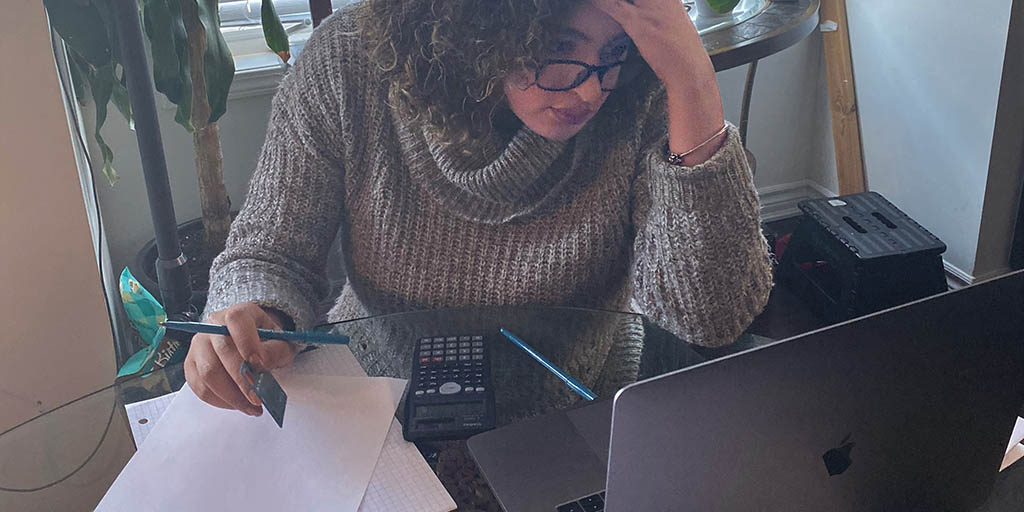Seven ways to take charge of your finances
 CREDIT: SALMA HUSSEIN
CREDIT: SALMA HUSSEINToday's decisions can have a significant impact on your financial future.
In life, we’re either chasing or being chased. As students, we’re chasing our dreams, but our piling debts are chasing us. And before you know it they’ve caught up with you, and soon after, you’re drowning because you can’t keep up with the pace anymore.
Sometimes I look at the change in my wallet and a single question crosses my mind: “How much food can I buy with $1.30?” Ramen of course, but we all know that’s never the healthy option. Yet, it seems to be the only option we have; why is that? Because we don’t look at the root of why we end up with only a couple of coins in the worn-out pocket of our wallets.
The best way to solve most problems in life is to find the root of the problem to find a solution. In the case of finances, preparing early is best so we’re not looking for loose change under the couch as an income.
1. Start saving so you can indulge your cravings. If you don’t already own a debit card, then take the time to visit a local bank and open an account. Correction, two accounts: a chequing account and a savings account. People tend to like the former than the latter. Savings collect money or dust depending on how you distribute your income.
I know it’s hard to shift that money to your savings, but it’s necessary. Your future self is thanking you for that transfer because now they can eat, pay for rent, school, and ice cream. My mom always used to tell me to save the hundreds and use the tens. That way you can have some spending money and save a lot at the same time.
2. Earn a dime by working part-time. Have a little spare time? Then start bugging your working friends to hook you up, because you can’t start saving if there’s no money to be saved. If bothering your friends doesn’t work, which 99 per cent of the time is what happens, then try online job services like Indeed or LinkedIn for a broader search.
If you can barely balance academics let alone hop on a bus and work until the wee hours, only to get home and start your homework, finish, and then realize you only have three hours to sleep until your next lecture, then try more flexible jobs like tutoring or babysitting.
3. Scholarships and bursaries up for grabs. Have you visited Fanshawe’s Financial Aid online page yet? If you haven’t already, check out the scholarships and bursaries available to any Fanshawe student. Did you know that many scholarships are not taken because people simply don’t apply to them? Take the time to apply to any scholarship or bursary you are eligible for at Fanshawe, and external scholarship sites like scholartree.ca, and scholarshipscanada.com.
If you need help applying for scholarships and bursaries, drop in for some financial readiness sessions, available from Nov. 11 to Dec. 9 in room D2016 from 9 a.m. to 10:30 a.m.
4. Good credit, bad credit. Credit cards can be our greatest Achilles’ heel. Don’t get one if you know you can’t pay it off. It sounds obvious and you would never think you would be one of those people who end up with bad credit. Think again; the temptation of the credit card is too powerful.
No credit history is better than bad credit, if you can’t handle its powers at the moment, don’t ruin it for your future self. Wait until the time is right.
5. Let’s get rich! How do you think the rich get richer? They buy things with value, in other words, they invest. Investing can be a test of patience, especially when the results are not immediate.
I keep on mentioning your future self for a reason, they are super comfortable right now because you invested. Set up an appointment with a bank advisor to determine the best investment plan for you.
6. Budgets and limits. To invest and save, you need to budget and limit your spending. So, think twice about buying your favorite tub of ice cream, or going out for sushi twice a week. Spend your money wisely so it can last longer.
A good way to budget is by planning out what needs to be purchased for the week. Eliminate what isn’t necessary and calculate the total for what is essential.
7. Take a long peek into your future. Planning and preparing yourself financially for the year ahead can save you a lot of time and money. Look into your tuition, textbooks, rent, work, and other essentials ahead of time so you can have a plan of action when the school year starts. Mark those dates for scholarship deadlines on your calendars, send your resumes to any jobs that suit you, and start transferring money to the account you dislike the most.
Stay financially smart, so you can make the most of your years as happy students instead of stressedout ones!















